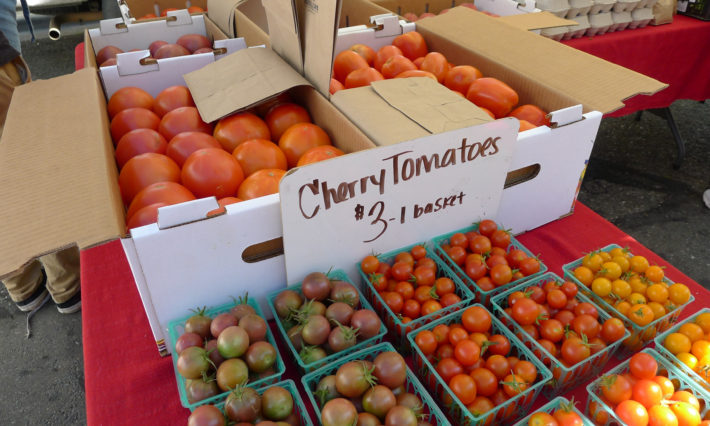By Gabriel Weaver
BERKELEY, Calif. — For more than 50 years, the Downtown Berkeley Farmers’ Market has led eco-friendly initiatives, including selling organic produce and striving to be waste-free. Vendors sell their food and products in glass jars, paper containers and paper bags and customers are encouraged to bring their own bags and containers.
Many of the farmers who vend at the market use natural or eco-friendly means of pest control or weeding. For example, Avalos Farm uses a vacuum system and beneficial insects. Other vendors, such as Four Sisters Farm, say that they do not need to use pesticides because their farm ecosystem is so healthy.
Rasa Dresser is the founder of Big Little Bowl, a company that promotes wellness through the practice of mindfulness and herbal traditions borrowed from Asian and European cultures. Hand-brewed teas and soups are Dresser’s main products and he uses his teas as a broth substitute in his soups, a unique combination that fuses the benefits of both products.
Dresser said he pursues a zero-waste initiative by selling his soups in glass jars and providing samples in mini ceramic bowls and cups. He also encourages his customers to clean and return their soup jars.
“Seeing my customers return the jars makes me happier than actually selling my soups,” he said.
Many customers at the Saturday market said they seek healthy and ethical produce created by local farmers and producers.
Coracao Confections creates variations of chocolates to accommodate those with dietary restrictions — products are vegan, gluten-free and dairy-free. They also remain organic by sourcing their ingredients from local producers, some of whom are represented in the market.
“We appreciate having fresh produce and supporting local farmers,” Ofra Fisher, an employee of Coracao Confections, said.
The Ecology Center itself, known for pledging to promote healthier living in the East Bay area, maintains a booth at each of the three weekly markets, and on a recent Saturday was giving away samples of different types of cucumbers to visitors. Staffers and volunteers pursue a weekly initiative to collect variations of the same product from the local farmers and have customers vote for their favorite. The top candidates are then bought from the farmers and sold to commercial grocery stores, an effort to connect and support the local producers to the community.
